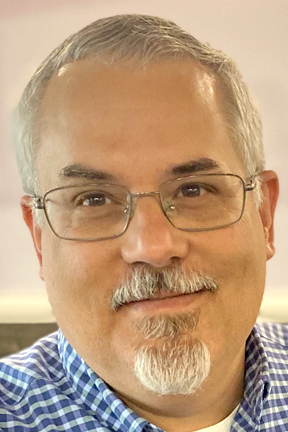Emboldened • Acts 4:8-21
By Roland L. McMillan

Acts 4 opens in the middle of a story that started in chapter 3, a part of the larger story of the Jesus movement in Acts. Peter and John had been going to the temple, had healed a man, and a curious crowd had gathered. Peter used their curiosity as an opportunity to talk about Jesus. As chapter 4 begins, they were arrested and spent a night in prison. They were brought before the Sanhedrin the next morning. This group was something like the Supreme Court and a legislature combined, but they also had some executive power under the Romans. The Sanhedrin asked about the authority behind the healing. Just like the people curious about the healing in Acts 3 from last week’s lesson, the question was an opportunity, a perfect set-up for Peter.
The lesson passage opens as Peter’s defense begins. Peter and John were not educated like priests, or scribes, or the upper class. They were ordinary people. Their accusers were amazed at their boldness, but Luke explained it as being a result of the Spirit (4:8,13). According to Josephus, the first-century Jewish-Roman historian, accused people who stood before the Sanhedrin usually acted humbly and dressed in mourning clothes (Antiquities 14.172). Being arrested and standing in front of the Sanhedrin was intimidating. In Luke 21:15 Jesus had said that, at a moment like this, words would be provided that opponents could not refute. That is exactly what happened here. Peter was not intimidated. Much like his sermons on Pentecost and in Acts 3, Peter based his sermon on facts about Jesus and on Scripture. He summarized the facts about Jesus, including his crucifixion and resurrection. He cited Psalm 118:22 in verse 11, implying that they were the ones who had rejected the cornerstone. In fact, only a few months had passed since Jesus had stood before this same group. They had sent him to Pontius Pilate to be crucified.
One part of Peter’s sermon is not immediately obvious in English. In the original language Luke used to write Acts, “healed” and “saved” are the same word. Many words have more than one meaning, depending on how they are used. In verse 9, this word is often translated “healed,” referring to physical healing. In verse 12, the same word is usually translated as “saved” in the sense of eternal salvation. Peter cleverly used two different meanings of the same word to answer his accusers and to tie the miraculous healing and eternal salvation together.
As the deliberations began, Peter and John were dismissed, and the irony in this passage becomes more apparent. In the minds of those who sat on the Sanhedrin, they were serious men. They were the educated religious and political elite, but a couple of yokels from Galilee had amazed them. Peter and John had been with Jesus, but the Sanhedrin could not stop Jesus. They had been behind his crucifixion, but even that had not stopped him. The men of the Sanhedrin thought they were in charge of the situation, but they did not know what to do. They were the power brokers of their society, or so they thought, but the claims of Jesus’ ultimate authority befuddled them. No amount of political “spin” could outrun the word-of-mouth grapevine spreading over the city. The man who was healed was standing there, and they could not argue with that. In the end, the accused were bold and eloquent, and the accusers stammered out threats. The men of the Sanhedrin thought that they were the authority, but Jesus is the real authority.
When the Sanhedrin ordered Peter and John to stop spreading the message about Jesus, they answered with a firm and polite “no.” Standing in front of the civil authorities, they appealed to God’s authority. Christians often make the best citizens. We believe in the rule of law, but there is a higher law. Everyone and everything, including human governments, are accountable to God. Through the centuries, Baptist theology has emphasized a free church in a free state as the ideal situation. The 1925, 1963, and 2000 Baptist Faith and Message statements all say, “God alone is the Lord of the conscience, and He has left it free from the doctrines and commandments of men which are contrary to His word or not contained in it.” Peter and John lived this truth. Caesar has his domain, but God is over all domains.
McMillan is pastor of Prentiss Church, Prentiss.




